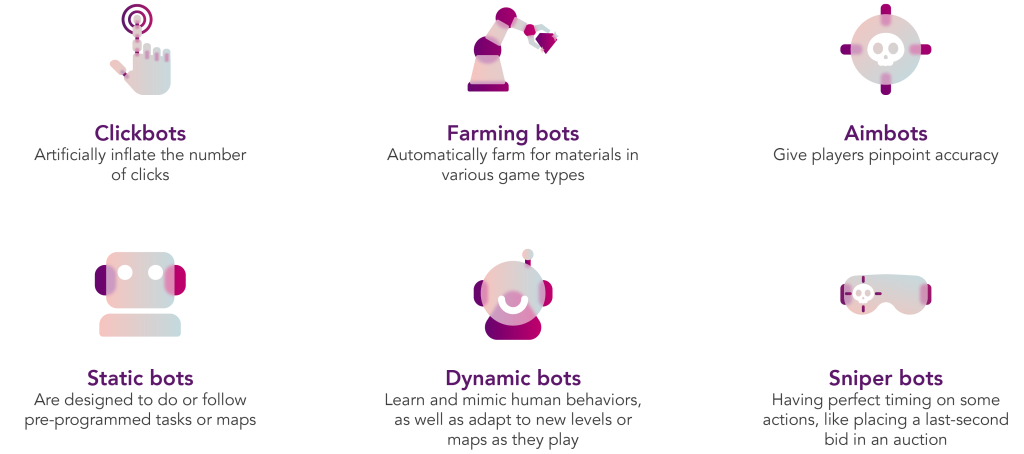
The gaming community and developers have engaged in a continuous battle against the misuse of macro bots. Game developers implement sophisticated detection systems to identify and penalize bot usage, striving to maintain fair play and the intended gaming experience.
While macro bots can enhance personal gaming experiences by maintaining timing between key press sequences, and large volumes of activity etc, its impact on the gaming industry is largely contentious. In fact, the gaming industry had the lion’s share of bad bot traffic (more than 58%).
What are Macro Bots?
Macro bots in gaming refer to software that record and automate repetitive events, tasks or actions within a game, without the need for human input. Working like a general map of behaviors, such macro bots can range from simple tasks like automatically pressing keys at certain intervals to more complex sequences that involve navigating game environments, executing specific in-game strategies, or farming resources.
How are Macro Bot Attacks Executed?
Macro bot attacks typically occur through the use of third-party software programs or scripts that automate gameplay actions within online games.

Here’s how these attacks take place:
-
Bot Development
It involves the creation of customized software programs or scripts by developers, tailored to interact with the game client or server. These bots are meticulously programmed to execute precise tasks or actions within the game environment, ranging from resource collection and character advancement to quest completion and combat engagement.
-
Injection or Hooking
Users of bots inject or hook the bot software into the game client or memory space, enabling it to engage with the game environment. This process may entail altering game files, injecting code into the game process, or utilizing external tools to interface with the game client.
-
Script Execution
After successful injection or hooking into the game client, the bot initiates the execution of pre-defined scripts or commands to automate gameplay actions. These scripts are capable of simulating mouse and keyboard inputs, navigating game menus, and performing in-game tasks without requiring manual intervention from the player.
-
Detection Evasion
Bot developers may employ various techniques to evade detection by anti-cheat systems and game developers. This can include obfuscating code, mimicking human behavior patterns, or periodically adjusting bot behavior to avoid detection.
-
Task Automation
Macro bots streamline repetitive tasks or actions in the game, like resource farming, character leveling, or combat engagement. This automation grants bot users unfair advantages over genuine players, enabling them to advance through the game faster and more efficiently.
-
Impact on Gameplay
Macro bot attacks can disrupt gameplay, undermine fairness, and negatively impact the gaming experience for legitimate players. They can also lead to economic imbalances, inflate in-game currencies, and compromise the integrity of the game environment.
Overall, macro bot attacks exploit vulnerabilities in online games to automate gameplay actions, gain unfair advantages, and disrupt the gaming experience for legitimate players. Game developers and publishers employ various countermeasures, such as anti-cheat systems, behavioral analysis, and client-server security protocols, to detect and mitigate bot activity and preserve the integrity of their games.
Mobile Applications most Impacted by Macro Bot Attacks
Macro bot attacks have a wide-ranging impact across various types of mobile applications, with a particular focus on online games and apps featuring virtual economies. Some of the prime targets include:
-
Massively Multiplayer Online Role-Playing Games (MMORPGs)
These games are highly vulnerable to macro bot attacks due to their intricate gameplay mechanics, persistent virtual worlds, and competitive player-versus-player (PvP) environments.
-
Multiplayer Online Battle Arena (MOBA) Games
MOBA games like League of Legends and Mobile Legends: Bang Bang are frequently targeted by macro bot attacks, given their intense team-based battles and strategic decision-making aspects.
-
Farming and Simulation Games
Titles centered around farming, city-building, and resource management often involve repetitive tasks and virtual economies, making them susceptible to exploitation by macro bots.
-
Idle Clicker Games
Also known as incremental games, these titles rely on players repeatedly tapping the screen to progress. Macro bots can automate this tapping process, allowing users to advance without active participation.
-
Trading and Auction Apps
Applications facilitating virtual trading, auctions, or marketplaces are potential targets for macro bot attacks. Bots may manipulate prices, inflate demand, or exploit arbitrage opportunities within these platforms.
-
Reward-Based Apps
Apps offering rewards or incentives for completing tasks, surveys, or watching ads may attract macro bot activity. Bots automate these processes, bypassing the human interaction required by the app.
In essence, any mobile application involving repetitive tasks, virtual economies, or competitive gameplay mechanics could fall prey to macro bot attacks. To safeguard against such threats, game developers and app publishers must implement robust security measures and anti-cheat systems to detect and mitigate bot activity, thus preserving the integrity of their applications.
Impact of Macro Bot Attacks on Gaming Applications
Macro bots can significantly impact gaming applications in several ways:
-
Automated Gameplay:
Macro bots can automate various aspects of gameplay, such as repetitive tasks, resource gathering, or combat actions. This can provide unfair advantages to players who use them, as they can perform tasks with greater efficiency and precision than human players.
-
Unbalanced Competition:
When some players use macro bots to gain advantages, it creates an unbalanced playing field where those who rely solely on their skills are at a disadvantage. This can lead to frustration among legitimate players and undermine the competitiveness and fairness of the game.
-
Economic Impact:
In games where in-game currency or items can be traded or sold, macro bots can artificially inflate or manipulate the game’s economy. This can devalue virtual goods, disrupt market dynamics, and undermine the game’s virtual economy, affecting both players and developers.
-
Server Overload:
Macro bots can generate excessive server load by performing repetitive actions or flooding the game’s servers with requests. This can result in server instability, lag, or crashes, impacting the overall gaming experience for all players.
-
Security Risks:
Macro bots may pose security risks by exploiting vulnerabilities in the game’s code or injecting malicious code into the game client. This can lead to account compromises, data breaches, or other security incidents, compromising the integrity and security of the game environment.
Overall, macro bots can have a detrimental effect on gaming applications by distorting gameplay, undermining fairness, disrupting economies, causing technical issues, and posing security risks to players and developers alike.
Mechanisms Used To Detect Marco Based Bot Attacks
To block and detect macro bots, game application owners can employ various strategies:
-
Anti-Cheat Systems
Implement robust anti-cheat systems that detect and prevent unauthorized third-party software, including macro bots, from interacting with the game client or server.
-
Behavioral Analysis
Use behavioral analysis techniques to identify abnormal player behavior patterns indicative of macro bot usage, such as repetitive actions, unnatural movement patterns, or rapid progression.
-
Client-Side Protections
Employ client-side protections, such as encryption, code obfuscation, and integrity checks, to make it more difficult for bot developers to reverse-engineer or manipulate the game client.
-
Server-Side Monitoring
Monitor server logs and telemetry data for signs of suspicious activity, such as unusually high request rates, consistent patterns of resource acquisition, or atypical player behavior.
-
Reporting Mechanisms
Implement reporting mechanisms that allow players to report suspected bot activity, enabling moderators and administrators to investigate and take appropriate action.
-
Regular Updates
Continuously update and patch the game client and server to address known vulnerabilities, exploits, and attack vectors used by macro bots.
By employing a combination of these strategies, game application owners can mitigate the impact of macro bot attacks, maintain a fair and balanced gaming environment, and preserve the integrity of their games.
How does AppSealing Helps in Macro Bot Detection?
AppSealing can analyze user behavior patterns within the app and identify deviations from normal usage patterns that may indicate macro bot activity. By monitoring user interactions and session data, AppSealing can flag suspicious behavior for further investigation.
Conclusion
The emergence and proliferation of macro bots within the gaming industry underscore a complex challenge that sits at the intersection of technology, ethics, and community engagement. Such automated macro programs, designed to execute repetitive tasks without human input, have significantly impacted both the player experience and the economic stability of online games. While they can offer convenience and efficiency for individual tasks, their widespread use threatens the fairness and integrity that form the core of competitive gaming.
AppSealing’s feature is designed with a focus on safeguarding gaming applications against automated threats. The feature bifurcates into two essential settings: “Allow” and “Block.”
The “Block” option serves as the default setting. When activated, it ensures the immediate shutdown of the gaming app if a macro tool is detected on the user’s device. This preemptive security measure is crucial for maintaining the integrity of the gaming environment, protecting against the potential for unfair advantage and other risks associated with macro automation.
On the flip side, the “Allow” setting offers developers and users the discretion to keep the gaming app active, even on devices where macro tools are present. This flexibility allows for a broader range of app usage scenarios but introduces a calculated risk. By permitting the operation of macro tools, there’s an inherent increase in the vulnerability to automated exploits, potentially compromising the gaming experience and fairness.
This dual approach highlights the delicate balance between operational flexibility and the imperative of safeguarding the gaming ecosystem from manipulation and automated threats.





